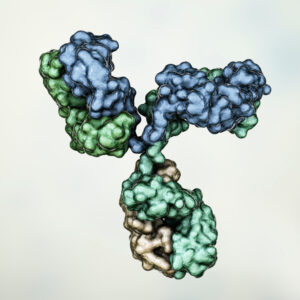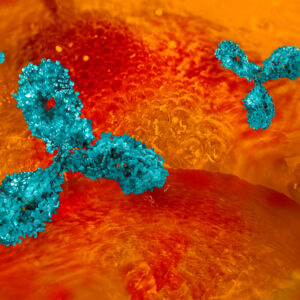Canine Coronavirus
Canine coronavirus (CCoV) is an alphacoronavirus which infects dogs and is closely related to enteric coronaviruses of cats and pigs. CCoV is emerging as a significant pathogen in veterinary medicine, and is becoming an important cause of disease. Traditionally it has caused mild gastro-intestinal clinical signs, but there are increasing reports of lethal CCoV infections in dogs.
Canine Coronavirus Background
Coronaviruses are enveloped, single-stranded, positive-sense RNA viruses that infect humans and a wide variety of animal species. Canine coronavirus (CCoV) was first isolated and recognised as a pathogen of dogs in 1971, during an outbreak of gastroenteritis in military dogs (Binn et al., 1974). CCoV are large, enveloped, positive-stranded RNA viruses. Their particles are enveloped and are composed of four major structural proteins; spike (S), envelope (E), membrane (M), and nucleocapsid (N). The association of the N protein with the genomic RNA forms the helical nucleocapsid that is surrounded by an icosahedral structure composed of the viral M protein. The virus enters cells upon receptor binding and membrane fusion (mediated via the viral S protein) and replicates within the cytoplasm. It then exits the cell via exocytosis (Licitra et al. 2014).
There are two known types of canine coronaviruses; CCoV is a member of the alphacoronavirus genus, and the more recently identified canine respiratory coronavirus (CRCoV) is a member of the betacoronavirus genus. CCoV is closely related to transmissible gastroenteritis virus (TGEV) of pigs, ferret coronavirus and feline coronavirus (FCoV); whereas CRCoV is more closely related to bovine coronavirus. CCoV contains two distinct serotypes, type I and type II which have markedly different spike proteins. It has been proposed that type I CCoVs and FCoVs evolved from a common ancestral virus, and that the canine and feline type II lineages arose from multiple recombination events with an unidentified genetic source (Buonavoglia et al., 2006; Licitra et al. 2014).
CCoV is transmitted by the fecal-oral route and infection in dogs is usually restricted to the enteric tract with a self-limiting infection which generally produces only mild or asymptomatic forms of enteritis. However, more recently a pantropic, highly pathogenic variant of CCoV type II has been identified (Buonavoglia et al., 2006). Canine enteric coronavirus (CCoV) is an alphacoronavirus infecting dogs that is closely related to enteric coronaviruses of cats and pigs. While CCoV has traditionally caused mild gastro-intestinal clinical signs, there are increasing reports of lethal CCoV infections in dogs. CCoV infection can be fatal, particularly in puppies co-infected with other pathogens such as canine parvovirus. However, an increasing number of reports of infections by highly virulent CCoVs (pantropic CCoV) have been reported in puppies without apparent coinfections (Licitra et al. 2014).
Inactivated and modified-live virus vaccines are commercially available, but provide incomplete protection as they reduce, but do not eliminate CCoV replication in the intestinal tract. There are no anti-viral drugs available for treatment of CCoV infection.
References
- Binn et al. (1974). Recovery and characterization of a coronavirus from military dogs with diarrhea. Proc Annu Meet U S Anim Health Assoc. (78):359-66.
- Buonavoglia et al. (2006). Canine Coronavirus Highly Pathogenic for Dogs. Emerg Infect Dis. 12(3): 492–494.
- Licitra et al. (2014). Canine Enteric Coronaviruses: Emerging Viral Pathogens with Distinct Recombinant Spike Proteins. Viruses. 6(8): 3363–3376.
- Guise (2020). Can Dogs Get Coronavirus (COVID-19)? What We Know So Far. https://fluentwoof.com/dogs-coronavirus-covid-19/
Canine Coronavirus Antigens
We are please to offer an inactivated and purified canine coronavirus. This antigen is suitable for use in assay development, vaccine research and as antigens for the preparation of CCoV-specific antibodies.
Canine Coronavirus Antibodies
We offer a pair of monoclonal antibodies that are specific to canine coronavirus nucleoprotein and are suitable for use in immunoassay development and vaccine research.
Questions?
Check out our FAQ section for answers to the most frequently asked questions about our website and company.



